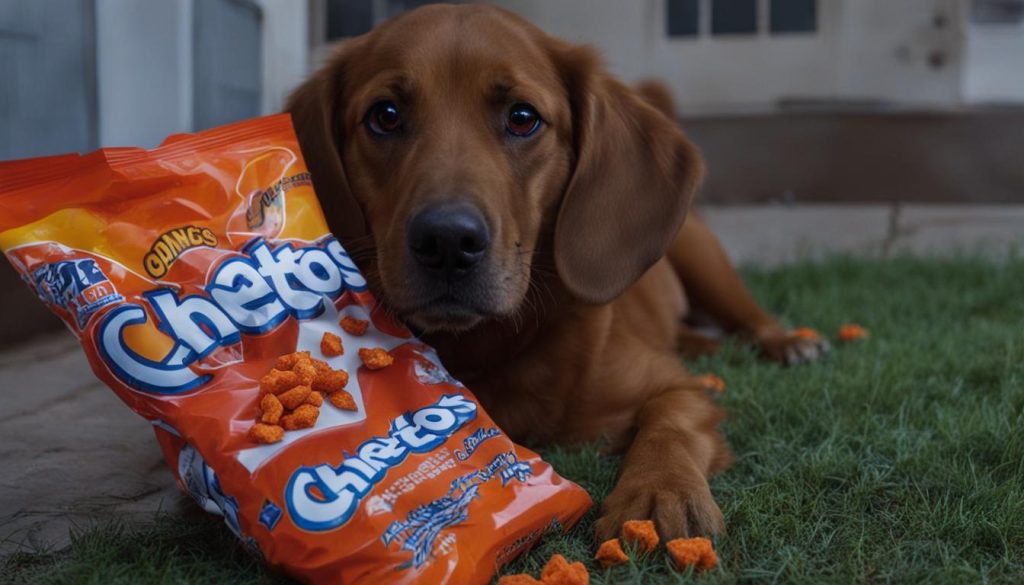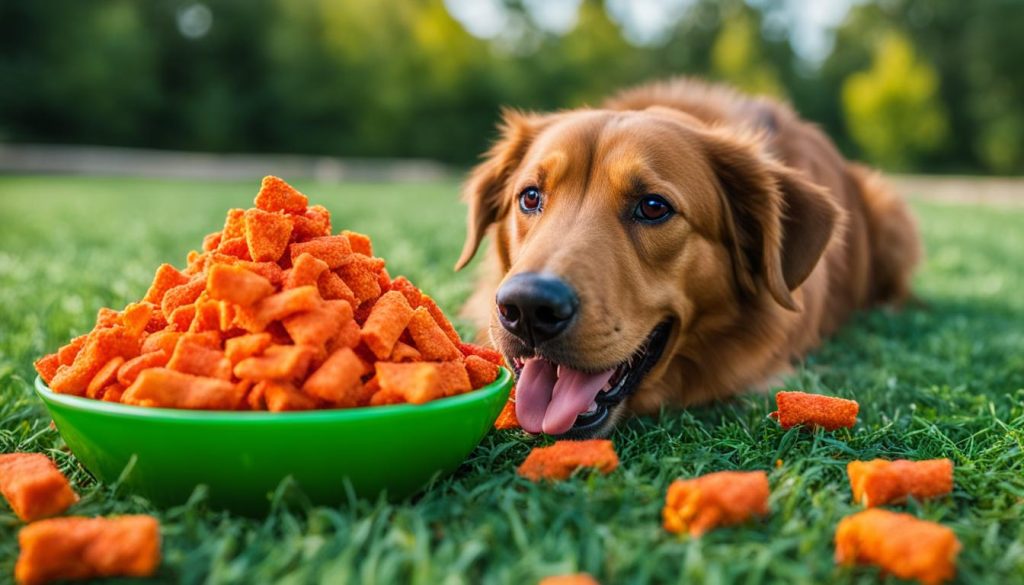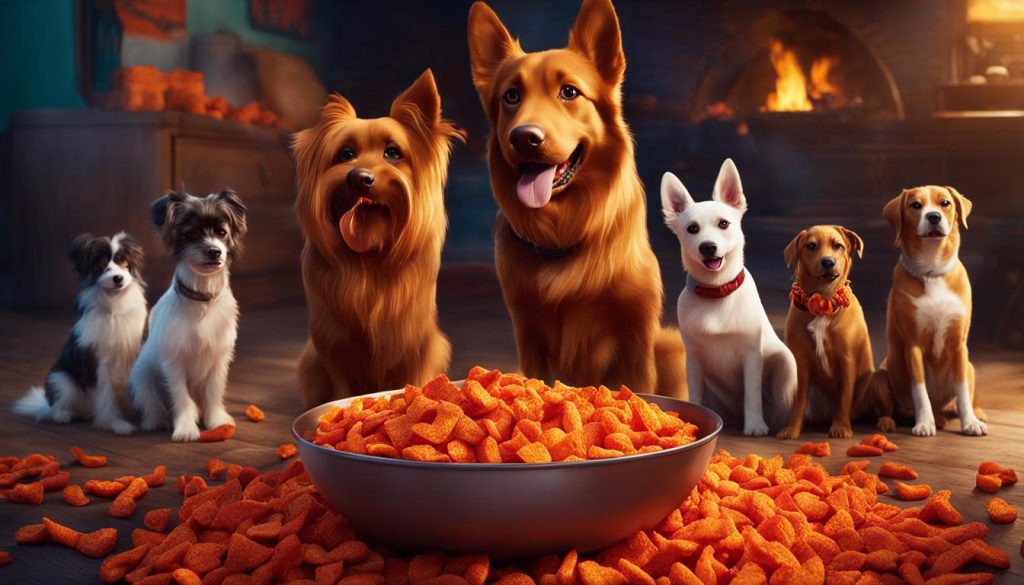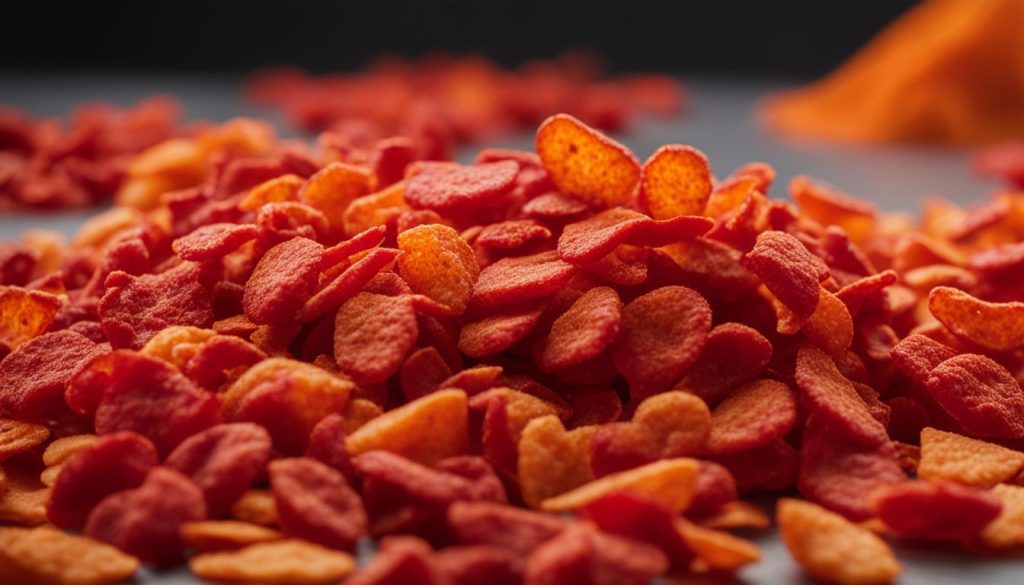Welcome to this informative article where we delve into the fascinating world of pet-friendly snacks. Today, we will be discussing a popular question: Can dogs have hot Cheetos? Many pet owners have wondered about the safety of sharing this spicy treat with their furry friends. Let’s explore the topic in detail and find out if hot Cheetos are suitable for our canine companions.
Key Takeaways:
- Hot Cheetos are not recommended for dogs due to potential gastrointestinal distress.
- Dogs have lower spice tolerance and sensitive mouths, which can make hot Cheetos harmful.
- The high-fat content and artificial flavors in hot Cheetos can lead to indigestion and allergies in dogs.
- Safe alternatives to hot Cheetos for dogs include organic treats, fresh fruits, and cooked vegetables.
- Feeding hot Cheetos to dogs can pose risks such as dehydration, stomach irritation, and obesity.
About Hot Cheetos
Hot Cheetos are a popular snack made from corn, vegetable oils, cheese powder, sugar, and artificial flavors. They have a high-fat content and contain around 140 calories and 10 grams of fat per serving. The ingredients list includes natural and artificial flavors, which can be a combination of various ingredients.
Ingredients in Hot Cheetos:
| Ingredients | Description |
|---|---|
| Corn | Base ingredient made from maize kernels. |
| Vegetable Oils | Added for flavor and texture. |
| Cheese Powder | Provides the cheesy taste. |
| Sugar | Enhances the flavor and adds sweetness. |
| Artificial Flavors | Provides additional taste and aroma. |
The combination of these ingredients gives hot Cheetos their distinctive taste and texture. The snack is known for its vibrant red color, which is achieved through the use of food dyes.
“Hot Cheetos are a popular and addictive snack loved by many. However, be aware of the ingredients and nutritional information before indulging in them.”
Understanding the ingredients in hot Cheetos can help pet owners make informed decisions about whether it’s safe to share this snack with their dogs. In the next section, we will explore whether dogs can eat hot Cheetos and the potential risks associated with it.
Can Dogs Eat Hot Cheetos?
Dogs should not eat hot Cheetos as they can be harmful to their health. Hot Cheetos contain high levels of fat, artificial flavors, and spices, which can cause digestive issues and discomfort in dogs. Additionally, dogs have different nutritional needs compared to humans, and the ingredients in hot Cheetos may not be suitable for their dietary requirements. I recommend that you prioritize the well-being of our furry friends by offering them safe and dog-friendly snacks.

The high fat content in hot Cheetos can lead to indigestion and may contribute to obesity in dogs. The artificial flavors and spices can also cause allergies and sensitivities in some dogs. Furthermore, the spiciness of hot Cheetos can lead to mouth and throat burns in dogs, as they have a lower spice tolerance compared to humans. If a dog consumes hot Cheetos, they may experience symptoms such as upset stomach, vomiting, diarrhea, redness in the face, and excessive scratching.
You should also provide dogs with appropriate and safe alternatives to hot Cheetos. Organic dog treats made without artificial flavors and preservatives, as well as fresh fruits and cooked vegetables, can be healthier options. Unsalted popcorn and plain rice cakes can also serve as low-calorie alternatives. It’s always best to consult with a veterinarian regarding your dog’s dietary needs and to ensure their well-being.
Alternatives to Hot Cheetos for Dogs
When it comes to finding safe and healthy snacks for dogs, there are plenty of alternatives to hot Cheetos that can satisfy their cravings without putting their health at risk. Here are some dog-friendly alternatives that you can consider:
Organic Dog Treats
Organic dog treats, such as beef jerky, rawhide bones, and chicken wings, are healthier options compared to hot Cheetos. These treats are made without artificial flavors, dyes, and preservatives, making them a safer choice for your furry friend. They provide a tasty and satisfying snack while ensuring the well-being of your dog.
Fresh Fruits and Cooked Vegetables
Fresh fruits like bananas, watermelon, and apples, as well as cooked vegetables such as carrots and green beans, can also make excellent treats for dogs. These natural snacks are packed with vitamins and minerals, and they offer a refreshing and nutritious alternative to hot Cheetos. Just remember to remove any seeds or pits that could pose a choking hazard.
Unsalted Popcorn and Plain Rice Cakes
If you’re looking for low-calorie alternatives to hot Cheetos, unsalted popcorn and plain rice cakes can be a great option. These snacks are light and crunchy, providing a satisfying texture without the added fat and spices found in hot Cheetos. Just be sure to avoid popcorn with added butter or salt, as these can be harmful to dogs.
To put it simply, moderation is key when offering treats to your dog. Even though these alternatives are safer than hot Cheetos, it’s still important to consider your dog’s overall diet and nutritional needs. Always consult with your veterinarian if you have any concerns or questions about what treats are suitable for your furry friend.

The Risks of Feeding Hot Cheetos to Dogs
Feeding hot Cheetos to dogs can pose several risks. The high salt content in hot Cheetos can lead to dehydration and electrolyte imbalances. Dogs have different salt requirements than humans, and excessive salt intake can be harmful to their health. Additionally, the spices and artificial colors used in hot Cheetos can cause stomach irritation and digestive issues in dogs. These ingredients may not be well-tolerated by a dog’s digestive system, leading to discomfort and potential vomiting or diarrhea.
The high fat content in hot Cheetos is another risk factor for dogs. Dogs have different nutritional needs than humans, and consuming excessive amounts of fat can lead to obesity and other health problems over time. The high fat content in hot Cheetos can also contribute to pancreatitis, a condition characterized by inflammation of the pancreas. Symptoms of pancreatitis in dogs may include vomiting, abdominal pain, and loss of appetite.
Furthermore, some ingredients commonly found in hot Cheetos, such as onion powder and garlic powder, can be toxic to dogs in large quantities. These ingredients can cause damage to a dog’s red blood cells, leading to anemia. You should also be mindful of all the ingredients in hot Cheetos and avoid feeding them to dogs to prevent any potential health complications.
Summary of the Risks:
- Dehydration and electrolyte imbalances due to high salt content
- Stomach irritation and digestive issues from spices and artificial colors
- Obesity and potential pancreatitis from the high fat content
- Toxicity from ingredients like onion powder and garlic powder
Table: Comparison of Potential Health Risks of Feeding Hot Cheetos to Dogs
| Health Risks | Consequence |
|---|---|
| Dehydration and electrolyte imbalances | Potential for kidney damage and imbalances in bodily functions |
| Stomach irritation and digestive issues | Vomiting, diarrhea, discomfort, and potential damage to the gastrointestinal tract |
| Obesity | Increased risk of various health problems, including joint issues and heart disease |
| Pancreatitis | Inflammation of the pancreas, leading to abdominal pain, vomiting, and potential organ damage |
| Toxicity from certain ingredients | Destruction of red blood cells and potential anemia |
You might want to prioritize your dog’s health and well-being by offering them safe and appropriate treats that are specifically designed for dogs. Consult with your veterinarian for recommendations on suitable alternatives to hot Cheetos, ensuring that you provide your furry friend with a balanced and nutritious diet that meets their specific nutritional needs.

What to Do if Your Dog Eats Hot Cheetos
If your dog accidentally eats hot Cheetos, take appropriate action to ensure their well-being. Here are some steps you can take:
- Monitor your dog: Keep a close eye on your dog for any signs of discomfort or illness. This includes symptoms such as vomiting, diarrhea, abdominal pain, excessive scratching, or redness in the face. If you notice any of these signs, it’s best to contact your veterinarian immediately.
- Call your veterinarian: If your dog is showing any concerning symptoms or if you’re unsure about the potential risks of hot Cheeto consumption, it’s always a good idea to seek professional advice. Your veterinarian will be able to provide specific guidance based on your dog’s individual health needs.
- Offer plenty of water: Providing fresh water for your dog is important to help flush out any potential toxins or irritants from their system. Encourage your dog to drink water and keep them hydrated.
- Prevention is key: To avoid situations where your dog can accidentally consume hot Cheetos or other harmful substances, I would advise that you keep these items out of reach. Store snacks and other food items in secure containers or cabinets to prevent accidental access by your curious canine.

To put it simply, every dog is unique, and their reaction to hot Cheetos may vary. While some dogs may experience minimal symptoms, others may have severe reactions. It’s always better to err on the side of caution and seek professional advice.
Benefits of Hot Cheetos for Dogs
While there may be claims of benefits to feeding hot Cheetos to dogs, such as protein intake and teeth cleaning, these claims are not supported by scientific evidence. Dogs have specific nutritional needs that are best met through a balanced and healthy diet. Feeding hot Cheetos does not provide any nutritional value to dogs.
You should remember that dogs have different digestive systems and sensitivities than humans. The high-fat content and artificial flavors in hot Cheetos can lead to gastrointestinal distress and potential allergic reactions in dogs. These snacks are not formulated with dogs’ dietary requirements in mind and can cause more harm than good.
“Feeding hot Cheetos to dogs is not recommended. Dogs should be provided with nutritious and dog-friendly alternatives to ensure their overall health and well-being.”
Instead of relying on hot Cheetos, consider offering your dog appropriate treats that are specifically designed for their nutritional needs. There are plenty of safe and healthy alternatives, such as organic dog treats, fresh fruits, and cooked vegetables. These options not only provide essential nutrients but also contribute to their overall health and vitality.

| Hot Cheetos | Dog-Friendly Alternatives | |
|---|---|---|
| Nutritional Value | Low | High |
| Hydration | No | Yes |
| Digestibility | Poor | Good |
| Allergenic Potential | High | Low |
As responsible pet owners, it’s our duty to prioritize our dogs’ health and well-being. Avoid the temptation to share hot Cheetos with your furry friend and opt for safer, healthier, and more suitable treats instead.
Can Dogs Handle the Spice in Hot Cheetos?
Dogs have a lower spice tolerance compared to humans. Their taste buds and digestive systems are not equipped to handle spicy foods like hot Cheetos. The capsaicin found in chili peppers, which gives hot Cheetos their spiciness, can cause discomfort and irritation in dogs. Eating spicy chips can lead to gastrointestinal issues such as vomiting, diarrhea, and stomach upset in dogs.
Spicy foods can also cause inflammation and burns in a dog’s mouth and throat. The sensitive nature of their oral tissues makes them more susceptible to these effects. I recommend that you remember that dogs have different dietary needs and preferences than humans. While we may enjoy the heat of spicy chips, it’s best to avoid subjecting our furry friends to the potential discomfort and health risks that come with consuming spicy foods.
If your dog accidentally ingests hot Cheetos or any other spicy chips, it’s recommended to monitor their symptoms closely. If they show signs of distress or exhibit unusual behavior, it’s advisable to consult with a veterinarian for further guidance. It’s always better to err on the side of caution and prioritize your dog’s well-being.

Table: Potential Risks of Dogs Consuming Spicy Chips
| Risks | Description |
|---|---|
| Gastrointestinal Distress | Dogs may experience vomiting, diarrhea, and stomach upset due to the spiciness and high-fat content of hot Cheetos. |
| Mouth and Throat Irritation | The spices in hot Cheetos can cause inflammation, burns, and discomfort in a dog’s mouth and throat. |
| Digestive Issues | Dogs may have difficulty digesting the high-fat content and artificial flavors found in hot Cheetos, leading to indigestion and gastrointestinal problems. |
| Allergic Reactions | Some dogs may be allergic to certain ingredients in hot Cheetos, such as artificial food additives, which can trigger allergic reactions. |
As responsible pet owners, please prioritize the health and well-being of our canine companions. Instead of sharing spicy chips with them, it’s recommended to offer dog-friendly treats that are safe and specifically designed for their nutritional needs. Choosing healthier alternatives such as organic dog treats, fresh fruits, and cooked vegetables can provide a tasty and nutritious snack option for your furry friend.
To put it simply, when it comes to sharing snacks with your dog, it’s always best to stick to treats that are safe and beneficial for their overall health. Your dog will appreciate the love and care you put into providing them with a balanced diet and suitable treats.
Hot Cheetos: A Brief History and Facts
Hot Cheetos, also known as Flamin’ Hot Cheetos, were introduced to the market in 1995 as a spicy variation of the original cheese-flavored Cheetos. These popular snacks are made from corn and coated with a flavorful blend of chili peppers and spices.
What makes Hot Cheetos stand out is their vibrant red color and the fiery kick they deliver with each bite. Over the years, the flavors and ingredients in Hot Cheetos have evolved to cater to the ever-changing tastes of consumers. While the specific details may vary, the core essence of Hot Cheetos remains an irresistible combination of heat and crunch.

Hot Cheetos have become a cultural phenomenon, gaining a devoted fan base and even inspiring various spin-off products and recipes. Their bold and addictive flavor has captured the attention of both young and old alike.
Notable Facts about Hot Cheetos:
- Hot Cheetos were originally created by Richard Montañez, a former janitor at Frito-Lay. His innovation and entrepreneurial spirit led to the creation of this iconic snack.
- Hot Cheetos have been praised for their ability to satisfy cravings for both spice and crunch, making them a go-to snack for many.
- Some people enjoy the “flamin’ hot” burn that Hot Cheetos provide, while others may find them too spicy to handle.
- Hot Cheetos have gained widespread popularity not only in the United States but also around the world, with fans from various countries indulging in their fiery goodness.
- As with any snack, moderation is key when enjoying Hot Cheetos. I recommend that you be mindful of portion sizes and consider incorporating them as an occasional treat rather than a daily indulgence.
Whether you love them or prefer a milder snack, there’s no denying the impact that Hot Cheetos have made in the snacking world. They have become a symbol of bold and adventurous flavors, and their popularity continues to grow.
Final Thoughts
To sum it up, it is not recommended to feed hot Cheetos to dogs. These spicy snacks can cause gastrointestinal distress, such as vomiting and diarrhea, in dogs due to their lower spice tolerance and sensitive mouths and throats. The high-fat content and artificial flavors in hot Cheetos can also lead to indigestion and allergies in dogs.
Instead, you should provide dogs with safe and healthier alternatives. Organic dog treats, fresh fruits, and cooked vegetables can be given as treats to dogs, while unsalted popcorn and plain rice cakes can be low-calorie alternatives to hot Cheetos. These options are free from artificial flavors, dyes, and preservatives that may be harmful to dogs.
If a dog accidentally consumes hot Cheetos, it is advisable to monitor their symptoms. If they show signs of discomfort, such as upset stomach, vomiting, and diarrhea, it is recommended to contact a veterinarian for further guidance. Additionally, you should keep hot Cheetos out of reach and offer treats that are specifically designed for dogs to prevent any potential health issues.
In order to ensure the overall well-being of dogs, it is best to provide them with a balanced and nutritious diet that meets their specific nutritional needs. If you have any concerns about your dog’s health or are unsure about what treats are safe, it is always a good idea to consult with a veterinarian.
FAQ
Can dogs have hot Cheetos?
No, hot Cheetos are not recommended for dogs due to their potential to cause gastrointestinal distress and other health issues.
What are hot Cheetos made of?
Hot Cheetos are made from corn, vegetable oils, cheese powder, sugar, and artificial flavors.
Are hot Cheetos safe for dogs to eat?
No, hot Cheetos are not safe for dogs to eat due to their high fat content, artificial flavors, and spices.
What are some alternatives to hot Cheetos for dogs?
Safer alternatives to hot Cheetos for dogs include organic dog treats, fresh fruits, cooked vegetables, unsalted popcorn, and plain rice cakes.
What are the risks of feeding hot Cheetos to dogs?
Feeding hot Cheetos to dogs can lead to digestive issues, dehydration, spice burns, obesity, and potential toxicity from certain ingredients.
What should I do if my dog eats hot Cheetos?
If your dog consumes hot Cheetos and shows symptoms of discomfort, such as vomiting or diarrhea, it is recommended to contact a veterinarian.
Are there any benefits to feeding hot Cheetos to dogs?
No, there are no proven benefits to feeding hot Cheetos to dogs. Dogs have specific nutritional needs that are best met through a balanced and healthy diet.
Can dogs handle the spice in hot Cheetos?
Dogs have a lower spice tolerance compared to humans and may experience discomfort, irritation, and burns from consuming spicy foods like hot Cheetos.
What is the history of hot Cheetos?
Hot Cheetos were introduced as a variation of the original cheese-flavored Cheetos in 1995. They are known for their bright red color and spicy taste.






